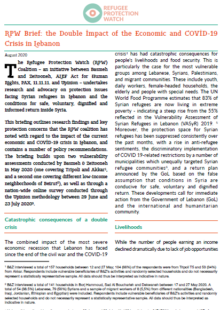Double impact of economic and COVID-19 crisis in Lebanon
November 29, 2020
Catastrophic consequences
Download 316.55 kb
This briefing outlines research findings and key protection concerns that the RPW coalition has noted with regard to the impact of the current economic and COVID-19 crisis in Lebanon, and contains a number of policy recommendations.
The Refugee Protection Watch (RPW) Coalition – an initiative between Basmeh and Zeitooneh, ALEF Act for Human Rights, PAX, 11.11.11. and Upinion – undertakes research and advocacy on protection issues facing Syrian refugees in Lebanon and the conditions for safe, voluntary, dignified and informed return inside Syria. The main findings are:
- Livelihoods: Only 4% of all surveyed respondents reported their income has remained the same since 18 March 2020;
- Food insecurity: 1 out of 5 Lebanese and Syrian households surveyed in Beirut and Tripoli/ Akkar reported eating only one meal per day. 658 out of 953 respondents (69%) of the nationwide online survey reported that they mainly need support to provide food;
- Access to aid: 97% of the respondents in Beirut, and 77% of those in Tripoli/ Akkar reported that they have not benefited from assistance distributed by UN agencies or other NGOs;
- Access to education: 50 and 55% of Syrian respondents in Beirut and Tripoli/Akkar reported that the school-aged children in their households have not attended school over the past 6 months;
- Social tensions: 63% of respondents in the nationwide online survey indicated that social tensions have increased in their community, mainly because of the financial crisis and the competition for increasingly scarce jobs, and a rise in discrimination.
- Prospects: Less than 2% of 436 Syrian and Palestinian Refugees from Syria (PRS) respondents in the nationwide online survey indicated they are planning to return to Syria in the coming 6 months.





